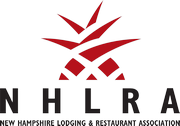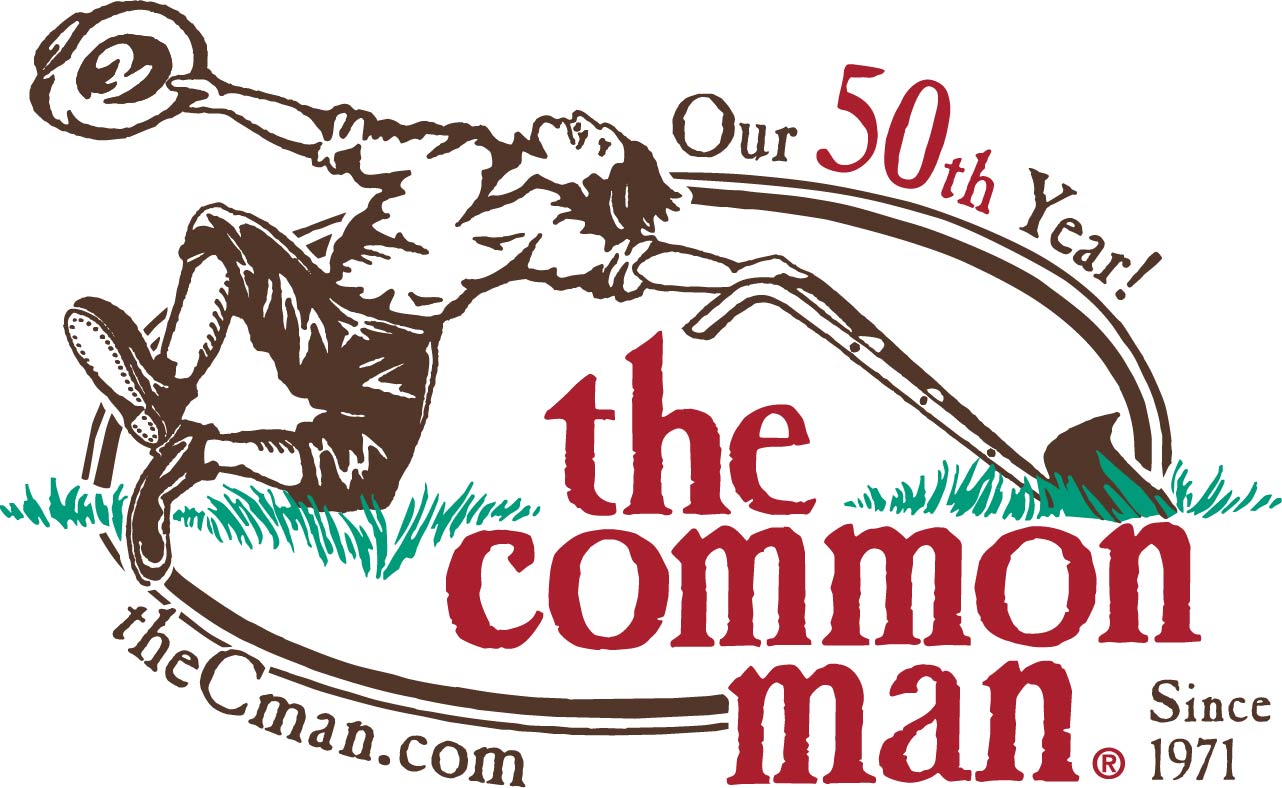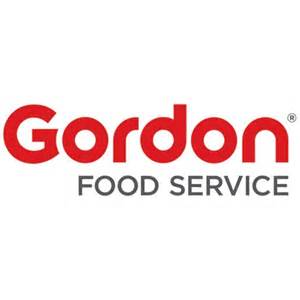Career Pathways
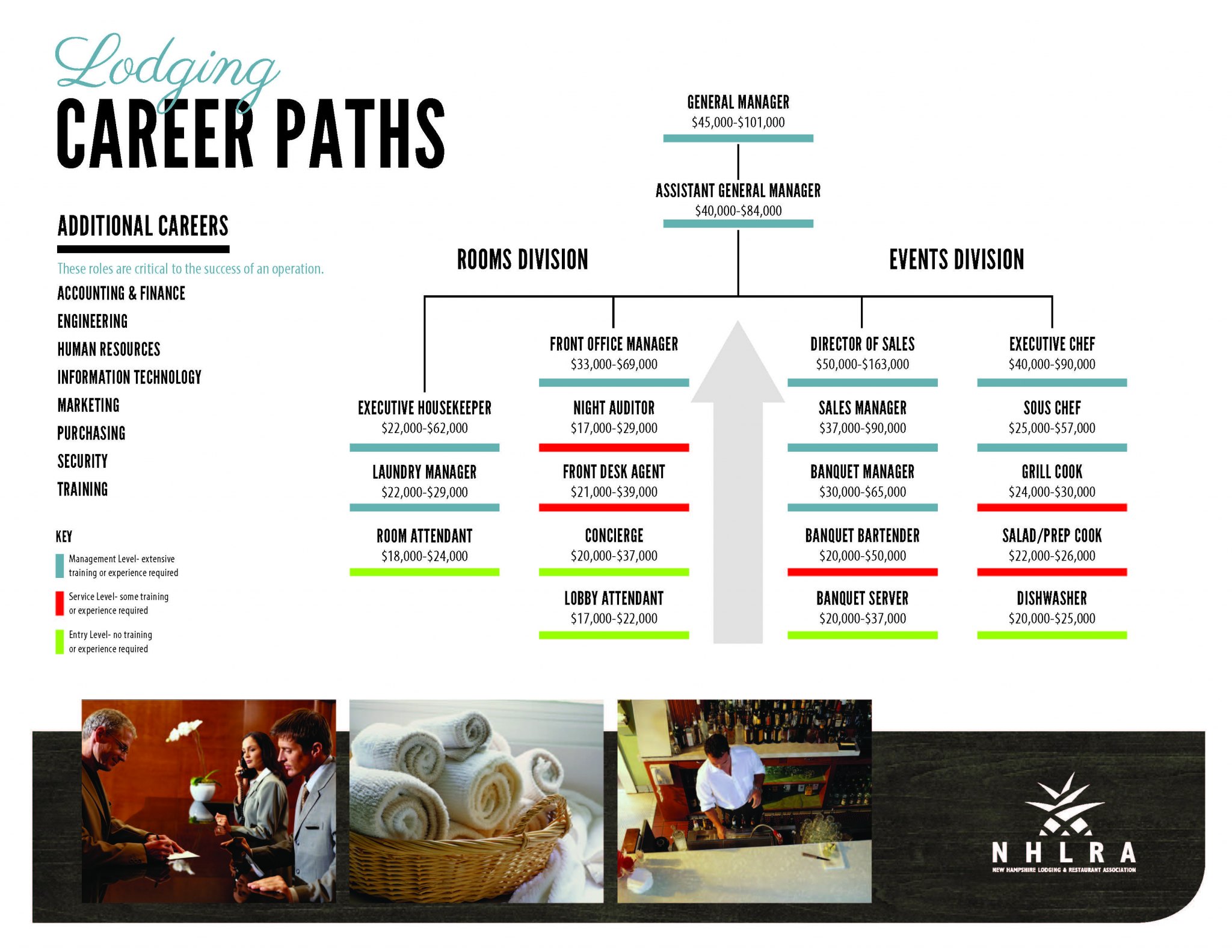
Management Level
General Manager– There is a number of management-level jobs in hospitality, including supervisor of guest services, housekeeping supervisor, front desk supervisor, and kitchen manager. One broad management job is hotel general manager. He or she makes sure that everything is running smoothly in all departments, including customer service, food, building maintenance, and more. He or she oversees much of the staff and ensures that guests are satisfied with their stays.
Assistant General Manager– A hotel assistant general manager’s main role is to respond to all hotel issues and problems to make sure the hotel runs smoothly each day. Second only to the hotel general manager, the assistant general manager oversees departments like housekeeping, advertising and marketing, and food service workers. In addition to overseeing all aspects of hotel daily operation including checking in with event coordinators, accounting managers, housekeeping employees, the assistant manager may also train new employees. Along with hiring managers and the front office team, the assistant manager ensures that each new employee learns how to treat each manager, employee, and guest with respect and professionalism. Assistant general managers oversee all hotel employees. With the help and final say from the general manager, the assistant manager handles all employee issues and disputes, deals with accounting issues and invoices, and supervises all employee hiring and layoffs.
Executive Housekeeper– Some of the duties that this position entails include human resource management for the housekeeping department staff, hiring, training, providing performance evaluations and dismissals as needed, scheduling the needed staff to cover shifts as well as knowing every detail of housekeeping and laundry for the hotel. The executive housekeeper is responsible to maintain the inventory of housekeeping supplies and amenities as well as maintain them within the allotted budget. They perform quality inspections throughout the hotel and deal with complaints regarding anything housekeeping related.
Laundry Manager– The Laundry Manager is responsible for running the laundry department’s day to day operations and also to deliver an excellent guest experience while managing stock ordering and supplier relationships. Additional responsibilities include keeping up training, performance evaluations, scheduling, and supervising the personnel within the department.
Front Office Manager– The Front Office Manager directly supervises all front office personnel and ensures proper completion of all front office duties. Directs and coordinates the activities of the front desk, reservations, guest services, and telephone areas. Prepare monthly reports and budget for front office department.
Director of Sales– The primary goal of the Director of Sales is to make sure guests are satisfied and help solicit new or continuing business for the organization. He or she is in charge of ensuring the facility meets revenue goals in areas such as food, room rentals, and beverages. This typically includes overseeing not just guest rooms, but a banquet or rentable meeting space as well. He or she also has interactions with customers such as preparing information, receiving and responding to correspondence, and attending meetings before an event.
Sales Manager-Hotel sales managers are responsible for bringing in guests and making the hotel money. These professionals not only seek out business with individual guests, but also typically meet with larger groups such as churches, traveling executives, and family reunions to stay with their hotel. Agreements with large groups allow for successful repeat business which generates sales for the entire company.
Banquet Manager-The role of a banquet manger is to plan and oversees parties, banquets, conventions, and other special events hosted or catered. He or she is responsible for soliciting banquet business and ensuring customer satisfaction with all booked events. Coordinates and supervises the execution of all banquet functions to ensure client specifications are adhered to and that the function runs smoothly and efficiently. Possesses knowledge of food production and service and is able to perform all positions in banquet operations to supervise, direct, and train banquet personnel.
Executive Chef– The Executive Chef is responsible for the kitchen/kitchens. Ensures kitchens provide nutritious, safe, eye-appealing, properly flavored food and maintains a safe and sanitary work environment for all employees. Other duties include menu planning, budget preparation, and maintenance of payroll, food cost, and other records. Specific duties involve food preparation and establishing quality standards, training employees in cooking methods, presentation techniques, portion control, and retention of nutrients.
Sous Chef– The Sous Chef acts second-in-command in the kitchen, directing and managing cooks and other kitchen workers and taking over when the executive chef is absent. In a large establishment, the sous chef may be in charge of food production for one kitchen. In a smaller operation, the sous chef ensures that all food production workers are performing their duties as prescribed by the quality standards established by the executive chef. The sous chef assumes all the duties of the executive chef in the chef’s absence.
Service Level
Night Auditor– Some of the duties for a night auditor includes checking front office accounting records for accuracy and, on a daily basis, summarizing and compiling information for the hotel’s financial records. Tracks room revenue, occupancy percentages, and other front office operating statistics and prepares a summary of cash, check, and credit card activities, reflecting the hotel’s financial performance for the day. Posts room charges and room taxes to guest accounts including guest transactions not posted during the day by the front office cashier.
Front Desk Agent– A hotel front desk agent serves as the first point of contact for all guests. He or she typically check guests in and out of their rooms and answer any questions they have. A front desk agent needs strong customer service skills and good problem-solving abilities.
Banquet Bartender– The Banquet Bartender is responsible for setup, maintenance, and operation of the bar. Takes drink orders from patrons or servers and prepares and serves alcoholic and non-alcoholic drinks according to standard recipes. Mixes ingredients for cocktails and serves wine and bottled or draft beer. Rings in drink orders into register, collects payment, and makes change. May also wash and sterilize glassware, prepare garnishes for drinks, and prepare and replenish appetizers.
Grill Cook– A grill cook is a type of chef that specializes in preparing all types of grilled foods. Although a grill cook most often works with meat, his or her job can also involve working with a wide variety other foods and vegetables.
Salad/ Prep Cook– Food preparation workers perform many routine tasks under the direction of cooks, chefs, or food service managers. Food preparation workers prepare cold foods, slice meat, peel and cut vegetables, brew coffee or tea, and perform many other food service tasks.
Entry Level
Room Attendant– Housekeepers are responsible for maintaining a standard of cleanliness throughout the hotel. They typically clean individual hotel rooms as well as the common areas. They make beds, do laundry, clean bathrooms, and more. Being a housekeeper requires some physical stamina and strength, since you often have to lift heavy loads and be on your feet most of the day.
Concierge– A concierge interacts directly with customers, providing them with various services. He or she acts as a liaison, providing guests with particular services they might need. These services could range from providing a babysitter to getting tickets to a show to suggesting a restaurant.
Lobby Attendant– Also sometimes known as bellhops, lobby attendants handle baggage for guests. They might bring the luggage up to guests’ rooms or take luggage down to the lobby when a guest’s stay has ended. A related service job is a valet, whose job involves parking and later retrieving the cars of various guests.
Banquet Server– A banquet server is required to setup the tables and cutlery according to the menu and the number of guests arriving at the venue. He or she helps in decorating the venue and in carrying the dishes and drinks to the table. He or she serves the food, beverages, and desserts as per the order. A banquet server should be able to explain the guests about the ingredients and preparation style of various dishes if asked.
Dishwasher– Washes dishes, utensils, and other cooking appliances.
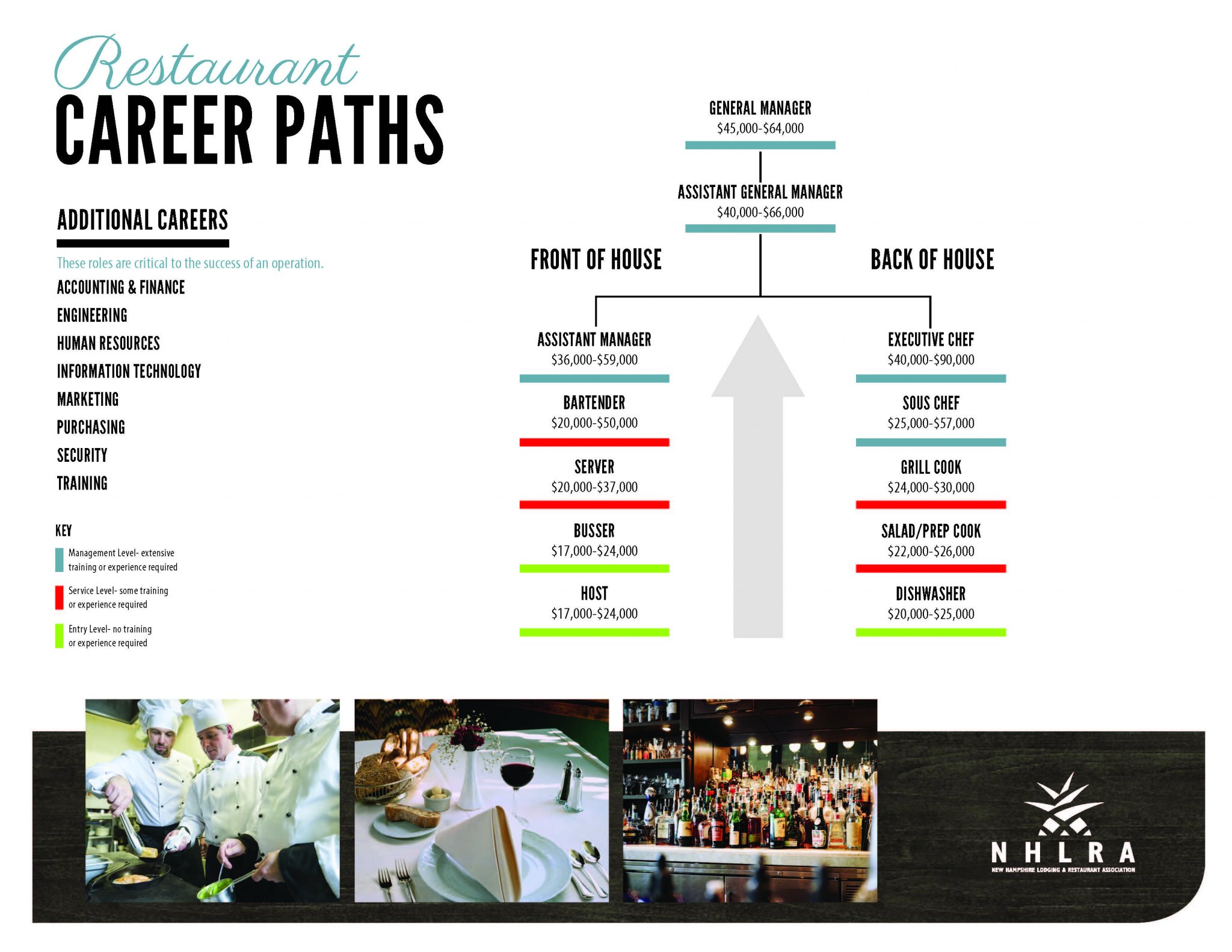
Management Level
General Manager– The General Manager coordinates foodservice activities as well as estimates food and beverage costs and requisitions or purchases supplies, equipment, and food and beverages. Confers with food preparation and other personnel from the dining room, bar, and banquet team to plan menus and related activities. Oversees cleaning and maintenance of equipment and facilities and ensures that all health and safety regulations are adhered to. He or she directs hiring, assignment, training, motivation, and termination of personnel. Investigates and resolves food quality and service complaints. May develop marketing strategy and implement advertising and promotional campaigns to increase business. May review financial transactions and monitor budget to ensure efficient operation and to ensure expenditures stay within budget limitations.
Assistant General Manager– Assistant General Managers share responsibility with the General Manager for the total operation of a single restaurant including building sales and all other aspects of profit and loss, hiring/training of management and hourly team, daily execution of safety/sanitation, quality food preparation, and guest service. He or she is responsible for the proper execution and operation of the kitchen department including all hiring/training of assistant kitchen managers and hourly team and may assume responsibility overseeing another cost area or specific hourly department. Share responsibility with the General Manager for the cleanliness, repair, and maintenance of the physical building.
Assistant Manager– An Assistant Manager’s role includes running the day-to-day operations, overseeing personnel, ensuring that the facilities are properly maintained, taking steps to ensure customer satisfaction, and overseeing the upkeep of administrative and financial records.
Executive Chef– The Executive Chef is responsible for the kitchen/kitchens. Ensures kitchens provide nutritious, safe, eye-appealing, properly flavored food and maintains a safe and sanitary work environment for all employees. Other duties include menu planning, budget preparation, and maintenance of payroll, food cost, and other records. Specific duties involve food preparation and establishing quality standards, training employees in cooking methods, presentation techniques, portion control, and retention of nutrients.
Sous Chef– The Sous Chef acts second-in-command in the kitchen, directing and managing cooks and other kitchen workers and taking over when the executive chef is absent. In a large establishment, the sous chef may be in charge of food production for one kitchen. In a smaller operation, the sous chef ensures that all food production workers are performing their duties as prescribed by the quality standards established by the executive chef. The sous chef assumes all the duties of the executive chef in the chef’s absence.
Service Level
Bartender– A bartender is responsible for setup, maintenance, and operation of the bar. Takes drink orders from patrons or servers and prepares and serves alcoholic and non-alcoholic drinks according to standard recipes. Mixes ingredients for cocktails and serves wine and bottled or draft beer. Rings in drink orders into register, collects payment, and makes change. May also wash and sterilize glassware, prepare garnishes for drinks, and prepare and replenish appetizers.
Server– Describes menu and daily specials, takes orders, serves food, and makes sure customers have everything they need to enjoy their meals. A server is responsible for coordinating entire station and communicating front- and back-of-house personnel to provide a dining experience that meets or exceeds guest expectations. Processes guest orders to ensure all items are prepared properly and on a timely basis. May carve meats, bone fish and fowl, prepare flaming dishes and desserts at table side and present, open, and pour wine when serving guests. Observes diners to ensure they are satisfied with food and service, responds to additional requests, and determines when the meal has been completed. Rings up bills and accepts payment or refers guests to cashier and may assist bus person in stocking, removing and resetting dishes and silverware between courses, and cleaning and resetting vacated tables.
Grill Cook– A grill cook is a type of chef that specializes in preparing all types of grilled foods. Although a grill cook most often works with meat, his or her job can also involve working with a wide variety other foods and vegetables.
Salad/ Prep Cook– Food preparation workers perform many routine tasks under the direction of cooks, chefs, or food service managers. Food preparation workers prepare cold foods, slice meat, peel and cut vegetables, brew coffee or tea, and perform many other food service tasks.
Entry Level
Busser– Bussers clean tables; take plates, utensils, and drinkware to the kitchen to be washed, make sure diners’ water glasses are full, and reset tables for the next service. Bussers might help waiters and waitresses bring food out to a table, restock utensils, napkins, and other dining room needs.
Host– You’ll need to cheerfully greet guests, take them to their table, and provide them with silverware and a menu. You’ll need to be able to monitor the table rotation and make sure that each member of the wait staff gets a fair amount of tables without giving them too many all at once. At the same time, you’ll need to know which servers you can count on to take extra tables when you get slammed with customers. You’ll also need to keep track of which tables are cleaned and available for new guests and you may even be required to answer the phone, take reservations and, in some cases, take-out orders.
Dishwasher– Washes dishes, utensils, and other cooking appliances.

ServSuccess
As the premier provider of educational resources, materials, and programs to help attract and develop a strong workforce, ServSafe has been the restaurant industry’s most trusted training resource. ServSuccess builds on that legacy to provide restaurant employees and employers with training and professional certifications that respect your industry hustle and help turn career aspirations into reality.
With the flexibility of online delivery and the brevity of “bite-sized” segments, ServSuccess learning is designed for professionals who know late nights and long workweeks all too well. And ServSuccess certifications transform those years of hard work and experience building into a passport to better opportunities and the career workers deserve. For more information, visit ServSuccess.

ServSafe Workplace
ServSafe Workplace is a new suite of training programs that focuses on creating and sustaining a safe and appropriate work environment for all employees. Get trained with ServSafe’s Sexual Harassment Prevention for the Restaurant Industry program to help create a harassment-free workplace. An interactive program that sheds light on the existence of unconscious bias, the impact on individuals and the workplace.
To learn more or to order your ServSafe Workplace course and assessment, please visit the ServSafe website.

Explore NH Careers
New Hampshire Lodging & Restaurant Association
16 Centre Street
Concord, NH 03301
Phone: (603) 228-9585
info@nhlra.com
